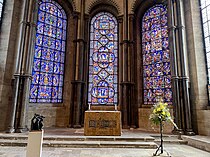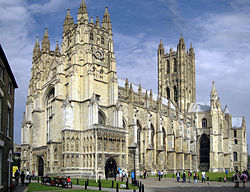Katedralen i Canterbury
| Katedralen i Canterbury Kristi katedral och metropolitkyrka i Canterbury | |
| Kyrka | |
Katedralen sedd från sydväst en septemberdag 2005. | |
| Land | |
|---|---|
| Ort | Canterbury |
| Trossamfund | Engelska kyrkan |
| Stift | Canterbury |
| Församling | Canterbury |
| Geonames | 6619924 |
| Katedralen i Canterbury, St. Augustine's Abbey och Sankt Martins kyrka | |
| Geografiskt läge | |
|---|---|
| Land | Storbritannien |
| Region* | Europa och Nordamerika |
| Data | |
| Typ | Kulturarv |
| Kriterier | i,ii,iv |
| Referens | 496 |
| Historik | |
| Världsarv sedan | 1988 (12:e mötet) |
| * Enligt Unescos indelning. | |
Katedralen i Canterbury (engelska: Canterbury Cathedral, fullständigt namn Cathedral and Metropolitical Church of Christ at Canterbury) är en katedral belägen i Canterbury, England och är även en av de äldsta och mest välkända kristna byggnaderna i England. Den är biskopssäte för ärkebiskopen av Canterbury, och därmed moderkyrka för Canterbury stift, Canterbury kyrkoprovins, Engelska kyrkan och Anglikanska kyrkogemenskapen. Samtidigt är katedralen även församlingskyrka för Canterbury församling.
På grund av Canterburys växande betydelse beordrade den förste normandiske biskopen Lafranc att en katedral skulle byggas i Canterbury på ruinerna av den gamla anglosaxiska katedralen och byggdes om många gånger efteråt.
År 1170 mördades ärkebiskopen Thomas Becket i katedralen under pågående vesper, vilket ledde till att den snabbt blev ett viktigt vallfärdsmål för pilgrimer som förevigades genom Geoffrey Chaucers Canterbury Tales.
Delar av katedralen förstördes i en brand 1174. Branden och återuppbyggnaden beskrivs av munken Gevase som bevittnade händelserna. Han berättar bland annat om den franske murmästaren Vilhelm av Sens som kom till Canterbury och ledde uppförandet av ett nytt kor. Vilhelm av Sens lät uppföra ett kor i den nya gotiska stilen och detta kom att utgöra inspiration för den efterföljande så kallade engelska gotiken.
Kung Henrik IV och Den svarte prinsen är begravda i katedralen.
Bilder
- (c) Canterbury Cathedral by David Dixon, CC BY-SA 2.0
- Interiör.
- Minnessten över John Buckingham, biskop av Lincoln.
- Tak med heraldiska vapen.
- Skulpturer föreställande Henrik V, Rikard II och Ethelbert.
Externa länkar
 Wikimedia Commons har media som rör Katedralen i Canterbury.
Wikimedia Commons har media som rör Katedralen i Canterbury.- Officiell webbplats
| |||||||||||||||||||
Media som används på denna webbplats
(c) Henrik Sendelbach, CC BY-SA 2.5
Världsarvsflagga på vid Stortorget i Karlskrona.
Författare/Upphovsman: Ad Meskens, Licens: CC BY-SA 4.0
Canterbury Cathedral: Sculptures of three of the six kings on the left hand side of choir screen (Pulptium); from left to right Henry V, Richard II, Ethelbert
Författare/Upphovsman: Tony Hisgett from Birmingham, UK, Licens: CC BY 2.0
Heraldic bosses on ceiling of South Porch (1422), Canterbury Cathedral. King Henry V and his chief magnates, including Archbishop of Canterbury Chichele. Dating evidence concerning careers of persons represented by the heraldry suggests it was built in 1422 (Source: Willement, p.9).
- 1: The arms of King Henry V (1413-1422) in centre is surrounded by 8 shields including 5 royal princes and dukes.
- 2: Henry Chichele (c.1364-1443), Archbishop of Canterbury (1414-1443) Or, a chevron between three cinquefoils gules, impaled by the arms of the See of Canterbury.
- 3: Beauchamp quartering Newburgh (Richard de Beauchamp, 13th Earl of Warwick (1382–1439))
- 4: Royal arms with a bordure argent (Humphrey of Lancaster, Duke of Gloucester (1390-1447) the youngest brother of Henry V, and the uncle of Henry VI).
- 5: Mortimer quartering de Burgh (Edmund Mortimer, 5th Earl of March (1391-1425), an important and loyal vassal of Henry V and Henry VI)
- 6: Royal arms with label of three points
- 7:Beaufort,: bordures compony argent and azure, the arms of Beaufort, legitimised progeny of John of Gaunt, 3rd surviving son of King Edward III: Royal arms of King Edward III within a bordure compony argent and azure. Maybe for Henry Beaufort, 2nd Earl of Somerset (1401–1418) and his younger brother and successor John Beaufort, 3rd Earl of Somerset (1404–1444).
- 8: Royal arms with a label of 5 points, the first 2 points ermine, the last three charged with fleurs-de-lys (John of Lancaster, 1st Duke of Bedford (1389-1435) the third son of King Henry IV, brother to Henry V, and acted as regent of France for his nephew Henry VI).
- 9: Beaufort: bordures compony argent and azure, the arms of Beaufort, legitimised progeny of John of Gaunt, 3rd surviving son of King Edward III: Royal arms of King Edward III within a bordure compony argent and azure. Maybe for Henry Beaufort, 2nd Earl of Somerset (1401–1418) and his younger brother and successor John Beaufort, 3rd Earl of Somerset (1404–1444).
- 10: Neville (Ralph de Neville, Earl of Westmorland (d.4 Henry VI));
- 11: Stafford (Humphrey Stafford, Earl of Stafford (d.38 Henry VI));
- 12: Sable fretty argent (Harrington)
- 13: Barry of six argent and azure (John Grey, Baron Grey of Codnor (d. 9 Henry VI)
- 14: de la Pole quartering Wingfield (William de la Pole, 1st Duke of Suffolk, KG (1396-1450), a favourite of King Henry VI).
- 15: Gules, semee of cross-crosslets a cinquefoil or (Sir Robert Umfraville, KG, (d.15 Henry VI))
- 16: Plantagenet, a label of three points argent (John Mowbray, Duke of Norfolk)
- 17: Courtenay, (Huge de Courtenay, Earl of Devon (d.1423)
- 18: Criol
- 19: Azure, a cross argent
- 20:
- 21: Beauchamp, with crescent for difference (Richard de Beauchamp, Earl of Worcester (d.1431));
- 22: Montagu quartering Monthermer; (Thomas de Montacute, Earl of Salisbury (d.1428)
- 23: Gules, on a chevron or three estoiles sable (Reginald Cobham, Lord Cobham of Sterborough (d.24 Henry VI))
- 24: St Leger
- 25: Plantagenet with bordure argent
- 26: Hungerford
- 27: de Quincy / Ferrers of Groby
- 28: de Vere, (John de Vere, Earl of Oxford (d. 1 Edward IV));
- 29: de Ros (John de Ros, Baron Ros of Hamlake, hereditary Chamberlain to the Archbishop of Canterbury)
(Source: Willement, Thomas, Heraldic Notices of Canterbury Cathedral; with Genealogical and Topographical Notes, London, 1827, pp.9-14 [1])
Further reading: Messenger, Commander A.W.B., The Heraldry of Canterbury Cathedral. Volume I. The Great Cloister Vault, 1947.Författare/Upphovsman: Christoph Matthias Siebenborn, Licens: CC BY-SA 4.0
Altarraum in der Kathedrale von Canterbury
Författare/Upphovsman: Hans Musil, Licens: CC BY-SA 4.0
Canterbury Cathedral: West Front, Nave and Central Tower. Seen from south. Image assembled from 4 photos.
(c) Canterbury Cathedral by David Dixon, CC BY-SA 2.0
Canterbury Cathedral
Författare/Upphovsman: Dr Bob Hall from Birmingham, England, Licens: CC BY-SA 2.0
Canterbury Cathedral
Författare/Upphovsman: Ealdgyth, Licens: CC BY-SA 3.0
Flagstone commemorating John Buckingham, Bishop of Lincoln, from the center aisle of the nave of Canterbury Cathedral
Författare/Upphovsman: No Swan So Fine, Licens: CC BY-SA 4.0
This is a photo of listed building number 1336823.



















